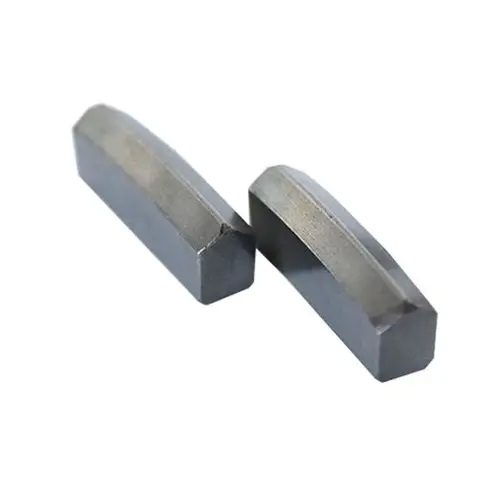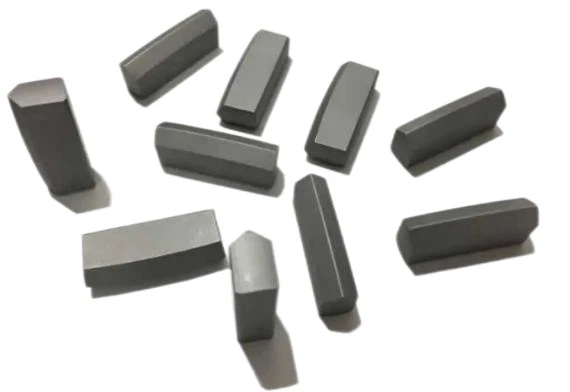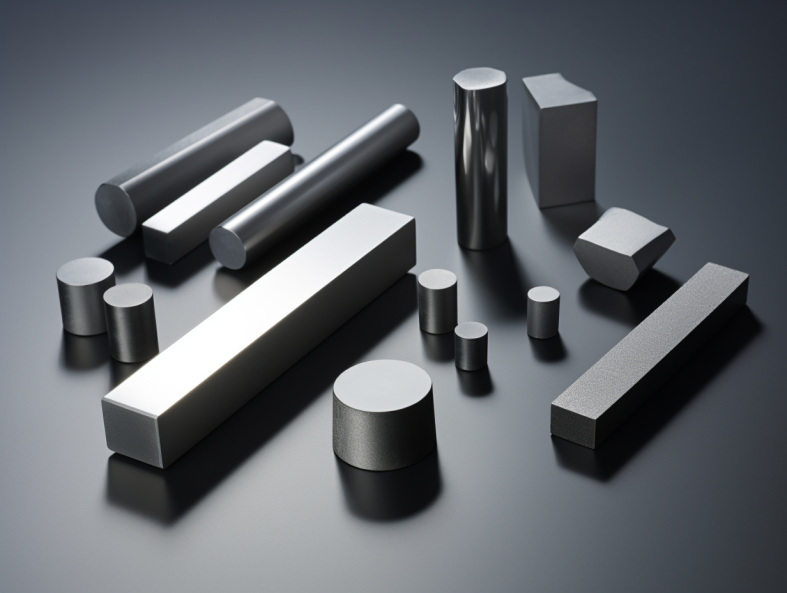Content Menu
● Introduction: The Importance of Carbide Chisel Tips
● What Are Carbide Chisel Tips?
● Manufacturing Process of Carbide Chisel Tips
>> 1. Powder Preparation
>> 2. Mixing and Milling
>> 3. Compaction and Forming
>> 4. Presintering
>> 5. Machining and Shaping
>> 6. Sintering
>> 7. Grinding and Finishing
>> 8. Advanced Coatings
>> 9. Rigorous Quality Control
● Technological Innovations in Arabia and Global OEMs
● Major Manufacturers and Suppliers in Arabia
>> ZHONGBO Carbide
>> Al Rizq Al Halal Trading (Dubai, UAE)
>> Kasweld (Saudi Arabia)
>> MDT Arabia Trading Company
>> Local OEM Producers
● Application Scenarios for Carbide Chisel Tips
● How to Select the Right Supplier
● Sourcing Best Practices for Buyers
● Future Outlook: Arabia's Role in the Global Supply Chain
● Conclusion
● Frequently Asked Questions (FAQ)
>> 1. Why are carbide chisel tips preferred over steel?
>> 2. How can buyers ensure they are purchasing genuine, high-quality carbide chisel tips?
>> 3. Are custom shapes and private branding available from suppliers?
>> 4. What advances in carbide tip manufacturing are available today?
>> 5. What factors should influence supplier selection beyond price?
Introduction: The Importance of Carbide Chisel Tips
Carbide chisel tips are at the heart of modern industrial efficiency across Arabia. Their unparalleled hardness, longevity, and resistance to heat and abrasion make them indispensable for a wide range of industries — from mining and stone fabrication to road construction, manufacturing, and precision tooling. As Middle Eastern economies rapidly diversify and expand their industrial infrastructure, the need for robust and reliable carbide chisel tips has never been greater.

What Are Carbide Chisel Tips?
Carbide chisel tips are precision-engineered components made primarily from tungsten carbide. Tungsten carbide, a compound of tungsten and carbon, is renowned for its extreme hardness — second only to diamond — and exceptional resistance to wear and high temperatures. These tips are welded or brazed onto chisels and various cutting, drilling, or carving implements. This combination enables tools to maintain sharpness and integrity far longer than conventional steel, reducing downtime and improving productivity.
Manufacturing Process of Carbide Chisel Tips
The creation of carbide chisel tips is a precise, technologically advanced process that directly impacts their final quality and application range.
1. Powder Preparation
Manufacturing begins with the preparation of ultra-fine powders of tungsten and cobalt. The tungsten provides hardness, while the cobalt acts as a binder. Purity and particle size are critical — any contaminants can degrade the performance of the finished tip.
2. Mixing and Milling
The powders are blended with binding agents and lubricants in high-energy ball mills. This process ensures a perfectly homogeneous mix, a necessity for producing tips that are uniformly hard and long-lasting.
3. Compaction and Forming
The mixed powder is loaded into precision molds that define the desired tip shape and size. Hydraulic presses apply tens of thousands of pounds per square inch to compact the powder into “green compacts.” These are fragile but retain the general geometry of the final tip.
4. Presintering
Compacts are heated in controlled furnaces at moderate temperatures. This stage hardens them slightly and drives out binders, enabling easy handling and further machining.
5. Machining and Shaping
Before full densification, the presintered compacts are machined to achieve tight dimensional tolerances. This “pre-sintered” state allows precise shaping with conventional tools.
6. Sintering
The compacts are sintered at temperatures around 1400°C in a special atmosphere. This final firing causes the cobalt binder to flow, pulling the tungsten carbide grains into a solid structure with the legendary hardness for which the material is known.
7. Grinding and Finishing
Diamond grinding wheels give the tips their final dimensions and sharp cutting edges. The exactness of this process ensures the best performance in application.
8. Advanced Coatings
Some tips receive coatings such as titanium nitride or aluminum oxide, which enhance surface hardness, reduce friction, and further extend tool life in extreme use cases.
9. Rigorous Quality Control
Manufacturers utilize powder analysis, density checks, microstructural inspection, hardness testing, and performance trials to confirm that each tip delivers maximum value and durability.
Technological Innovations in Arabia and Global OEMs
As the demand for Carbide Chisel Tips Manufacturers and Suppliers rises, both Arabian and global companies are investing in next-generation technologies:
- Nano-structured carbides, which take advantage of nano-scale grains for improved toughness and resilience.
- Additive manufacturing (3D printing), allowing complex tip geometries for custom applications.
- Advanced coating techniques, including PVD and CVD, to increase resistance to heat, abrasion, and corrosion.
Leading Chinese OEMs, such as those based in Zhuzhou, have pioneered mass production of carbide tooling and offer customization services to meet the branding and performance needs of international clients. This advantage allows foreign brands, wholesalers, and production companies in Arabia to secure tailored solutions — from custom tip designs to branded packaging.
Major Manufacturers and Suppliers in Arabia
ZHONGBO Carbide
Recognized as a leading Chinese supplier with vast export experience, ZHONGBO delivers a full range of carbide chisel tips and supports custom engineering, private labeling, and extensive OEM solutions. Their customer-centric approach has helped them forge solid partnerships with brands and distributors in Arabia and around the world.
Al Rizq Al Halal Trading (Dubai, UAE)
As a regional hub, Al Rizq Al Halal Trading offers a broad portfolio of imported carbide tips and inserts, managing distribution for top global brands. Their robust logistics ensure fast, reliable supply to a demanding client base that includes stone fabricators, metal workers, and construction firms.
Kasweld (Saudi Arabia)
Kasweld focuses on supplying high-quality carbide tools geared primarily towards the construction, pipeline, and shipbuilding sectors. Their expertise ensures that clients receive both world-class products and expert technical support.
MDT Arabia Trading Company
With a wide-ranging catalog and distribution rights for international tool brands, MDT Arabia Trading Company is a go-to source for industries in Saudi Arabia and neighboring Gulf countries seeking quality assurance, product diversity, and immediate availability.
Local OEM Producers
Companies based in Dammam, Jeddah, and Riyadh — often in cooperation with Chinese supply chains — provide localized solutions for big infrastructure projects, enabling project-specific designs, language compliance, and faster fulfillment times. Many leverage Chinese or global OEM capacity for raw material sourcing and final consolidation.

Application Scenarios for Carbide Chisel Tips
Carbide chisel tips are used in a multitude of industrial applications:
- Stone and Marble Carving: Sculptors and masons rely on carbide chisel tips for precise, detailed work. Their unmatched durability allows for intricate designs in even the hardest stones.
- Road and Bridge Construction: Used in jackhammers, drills, and trenchers, carbide-tipped tools cut through concrete and asphalt with ease, increasing job speed and reducing tool replacement frequency.
- Mining and Quarrying: Drilling and excavation processes are made possible and cost-effective by long-lasting carbide tips, which endure abrasive environments and high-impact conditions.
- Metalworking and Fabrication: Tips are found on lathes, planers, and chisels used for shaping, cutting, and dressing metal parts. Consistency and edge retention are vital for repeatability and productivity.
- Demolition and Renovation: Carbide chisel tips make short work of old concrete, brick, and tile removal, minimizing downtime and operator fatigue.
How to Select the Right Supplier
Choosing a supplier for carbide chisel tips in Arabia involves a balance of quality, reliability, consistency, and service.
- Certification and Standards Compliance: Look for ISO or equivalent certifications, which signal that rigorous quality assurance is in place.
- Customization Capability: For rebranding or tailored applications, choose OEM specialists who offer design, marking, and packaging solutions.
- Pricing and Value-Added Services: Assess not just cost but also terms, after-sales support, availability, and supplier communication.
- Sample Policy: Quality-oriented companies typically supply samples; use them to test fit, finish, hardness, and cutting performance.
- Local Support and Logistics: Regional partners or authorized distributors help ensure troubleshooting, rapid delivery, and technical guidance.
Sourcing Best Practices for Buyers
To maximize sourcing efficiency and avoid common pitfalls, buyers should:
- Build long-term relationships with both international OEMs and trusted regional agents for flexibility.
- Clearly specify technical requirements including tip size, material grade, and intended use.
- Compare offers on not just base pricing, but value-added services (e.g., rapid prototyping, documentation, technical consulting).
- Insist on comprehensive documentation such as factory test results, MSDS, and conformity certificates.
- Stay current with evolving trends, such as environmentally friendly binders, dust-reduced packaging, and energy-efficient sintering methods.
Future Outlook: Arabia's Role in the Global Supply Chain
Arabia's strategic geographic location, business-friendly reforms, and investment in industrial technology portend continued growth in carbide tooling manufacture and distribution. Efforts to localize component production — in coordination with Chinese, European, and American partners — are turning the region into both a major consumer and exporter of advanced carbide chisel tips.
Industry clusters in Saudi Arabia, the UAE, and beyond are expected to deepen integration with the global supply chain, facilitating even more rapid adoption of innovative manufacturing methods and digitalized logistics systems. Environmental sustainability is also drawing more attention, prompting investment in recyclable packaging and cleaner production methods.
Conclusion
The growth of Arabia's industrial ecosystem is inseparable from the reliability and performance of carbide chisel tips. From state-of-the-art OEM plants in China to high-tech regional suppliers in the Gulf, the landscape of *Carbide Chisel Tips Manufacturers and Suppliers* is more competitive and advanced than ever before. Whether you are a construction contractor, distributor, or a brand aiming for custom OEM supply, success depends on choosing partners equipped to deliver certified quality, responsive service, and innovative solutions. By applying the knowledge of manufacturing processes, supplier evaluation, and application scenarios presented in this article, buyers can navigate the complex market landscape with confidence and secure the robust carbide tooling required for modern industry.

Frequently Asked Questions (FAQ)
1. Why are carbide chisel tips preferred over steel?
Carbide chisel tips significantly outlast steel because of their exceptional hardness and resistance to heat and abrasion. They maintain sharpness longer and require less frequent replacement, saving operational costs.
2. How can buyers ensure they are purchasing genuine, high-quality carbide chisel tips?
Request documentation such as material certificates and quality reports, ask for reference clients, and start with sample orders to verify quality before large-scale procurement.
3. Are custom shapes and private branding available from suppliers?
Yes, most leading manufacturers and OEMs in China and Arabia offer custom sizing, specialized geometries, branding, and OEM packaging to match wholesale or project requirements.
4. What advances in carbide tip manufacturing are available today?
Suppliers now employ nano-carbide technology, advanced multi-layer coatings, and even 3D printing to enhance strength, wear resistance, and customizability of tips.
5. What factors should influence supplier selection beyond price?
Consider product consistency, technical support, certification, flexibility in customization, shipping reliability, and after-sales service.
















